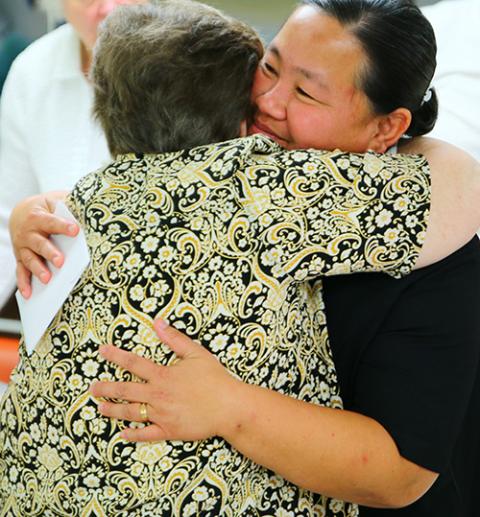
Sr. Cristina Soyao uses nature to cope with these challenging times. Taking a walk, noticing the beauty of creation, and finding the moon in the early evening hours gives her comfort. (Courtesy of Franciscan Sisters of the Sacred Heart)
I remember that visit with my first COVID-19-positive patient. At first, I was so focused on the virus that I forgot that she was a human being, a child of God, just like me. But God gave me courage and took the fear and anxiety about the virus away from me.
I have been a physical therapist assistant for almost 28 years and have been working with AMITA Health Presence Home Care based in Joliet, Illinois, for almost 12 years. Being a therapist is a calling I would say I grew into. Other people often recognize my gifts before I do. I entered this ministry with the thought of improving people's physical functional mobility, but it grew into helping them with not just the physical mobility aspect, but sometimes their spiritual and emotional well-being as well.
My very first client after I arrived here in the United States was a 6-year-old physically challenged child who taught me to never judge a book by its cover. She was fragile, delicate and unable to communicate. Most of my experience after college was in orthopedics, so this was something new. Working with her I learned a lot about different ways to communicate. The first time she smiled at me was like heaven because for the first time she responded to my attempt to communicate. Then I was able to assist her in her needs. I will never forget that encounter.

Sr. Cristina Soyao works with a patient. (Courtesy of Franciscan Sisters of the Sacred Heart)
When I prepare to meet a family who has just received terrible news, I get really anxious and scared because I don't always know what to say. The prayer of St. Francis — Lord, make me an instrument of your peace — paired with slow, deep breathing has always given me the courage to do God's will, to bring God's comfort and God's message to the situation. Often God's presence is revealed in just plain silence. This prayer always reminds me that it is another Christ that I am going to be meeting.
The COVID-19 pandemic has affected the kind of patients I normally work with. Since there were no orthopedic surgeries, most of the patients we saw at home care were suffering from shortness of breath, severe weakness, cardiac problems and debility. They appeared to be more stressed, anxious, exhausted and overwhelmed. This has all made me even more sensitive and attentive to their needs.
I have become more intentional in the way I treat people, always going above and beyond the scope of therapy, bringing in other people (family members, a social worker) in order to address a patient's need. I have become more vocal, expressing my concerns and not waiting for someone else to do something about it. But I make sure it is always a team effort. I have also become attentive to the well-being of their caregivers.
The hardest adjustment I had to make during the pandemic was the physical distancing. I love to give hugs. Not being able to console someone with a hug or a touch — especially when a smile was not visible — was hard, but God always found a way for me to communicate and let them know that I care.

Sister Cristina giving someone a hug (before the COVID-19 pandemic); she is known for giving wonderful hugs. (Courtesy of Franciscan Sisters of the Sacred Heart)
Also, I had to face the fear of getting the virus and passing it on to another patient or to a sister I live with. That means I had to take the extra measures of wearing the required personal protective equipment, changing my clothes and showering when I get home, and keeping the required distance. This effort was exhausting and time-consuming, but it had to be done.
The hardest challenge, I would say, has been coping with the loss of those who have died, and with not being able to sit with our sisters, friends, co-workers, and church family before they pass. Yet these challenging times have allowed me to be truly present in my prayers, to lift up —with all of my heart, mind and soul — these people and their families.
To cope, the Scriptures always ground me and bring me back to the reality of life's demands, blessings and goodness. I always start my day with the song "Psalm 91 (My God, In Him I Will Trust)" by Esther Mui. Connecting with my family and community helps me. There are the friends who listen to my struggles, as well as those who are not afraid to share their own struggles. Nature is another method of coping. Taking a walk, noticing the beauty of creation, and finding the moon in the early evening hours gives me comfort.
To have the health and energy to care for others, my advice is to sleep, rest, turn off all electronics and walk! The saints I most often pray to for guidance and intercession are St. Francis of Assisi and Mother Teresa of Kolkata. My favorite prayer is "Do It Anyway," often attributed to Mother Teresa. Then I remember what I have to look forward to when the pandemic is over: seeing people's faces, high-fives and hugs.
Advertisement
If I could send a message to the people I serve, it would be this:
- There is hope in life.
- Getting better needs an action on your part.
- Life is short, and every moment you have with each other is vital.
- Be more patient with your loved ones.
I want them to know what I have learned from them, too, during this pandemic:
- I have learned, surrender, humility, patience — to take one step at a time.
- A good sense of humor is important in recovery.
- I've become more creative in ways of doing therapy with my patients.
- God reveals Himself in different ways to every individual.
- God's time is not the same as my time.
As a reminder to me and anyone else who is longing for the pandemic to be over, I leave you with St. Paul's words to the Corinthians: "There is nothing love cannot face; there is no limit to its faith, its hope, and its endurance" (1 Corinthians 13:7).






